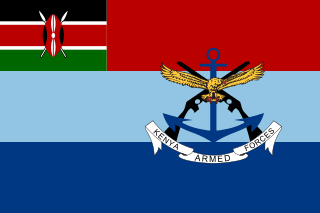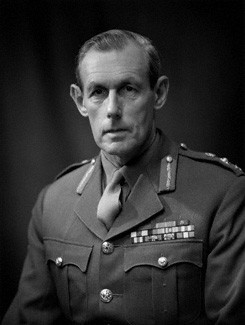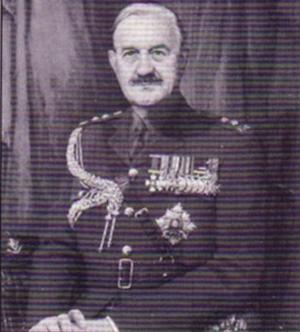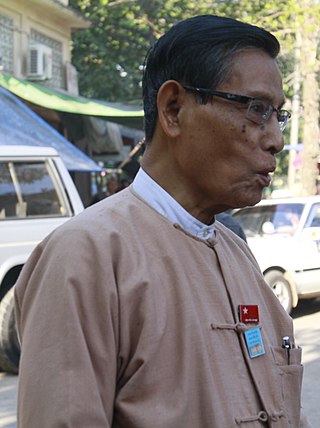
The Kenya Defence Forces (KDF) are the armed forces of the Republic of Kenya. They are made up of the Kenya Army, Kenya Navy, and Kenya Air Force. The current KDF was established, and its composition stipulated, in Article 241 of the 2010 Constitution of Kenya; it is governed by the KDF Act of 2012. Its main mission is the defence and protection of the sovereignty and territorial integrity of Kenya, recruitment to the KDF is done on yearly basis. The President of Kenya is the commander-in-chief of the KDF, and the Chief of Defence Forces is the highest-ranking military officer, and the principal military adviser to the President of Kenya.

An aide-de-camp is a personal assistant or secretary to a person of high rank, usually a senior military, police or government officer, or to a member of a royal family or a head of state.

Field Marshal Richard Michael Power Carver, Baron Carver, was a senior British Army officer. Lord Carver served as the Chief of the General Staff (CGS), the professional head of the British Army, and then as the Chief of the Defence Staff (CDS), the professional head of the British Armed Forces. He served with distinction during the Second World War and organised the administration of British forces deployed in response to the Mau Mau Uprising in Kenya and later in his career provided advice to the British government on the response to the early stages of The Troubles in Northern Ireland.

General Sir Peter Mervyn Hunt, was Chief of the General Staff, the professional head of the British Army, from 1973 to 1976. He served in the Second World War and commanded British Forces deployed in response to the Indonesia–Malaysia confrontation. Later in his career he provided advice to the British Government at a time of continuing tension associated with the Troubles in Northern Ireland.

Field Marshal Sir John Lyon Chapple, was a British Army officer who served as Chief of the General Staff (CGS), the professional head of the British Army, from 1988 to 1992. Early in his military career he saw action during the Malayan Emergency and again during the Indonesia–Malaysia confrontation and later in his career he provided advice to the British government during the Gulf War.

Air Chief Marshal Sir Henry Robert Moore Brooke-Popham, was a senior commander in the Royal Air Force. During the First World War he served in the Royal Flying Corps as a wing commander and senior staff officer. Remaining in the new Royal Air Force (RAF) after the war, Brooke-Popham was the first commandant of its Staff College at Andover and later held high command in the Middle East. He was Governor of Kenya in the late 1930s. Most notably, Brooke-Popham was Commander-in-Chief of the British Far East Command until being replaced a few weeks before Singapore fell to Japanese troops.

General Sir Alexander Stanhope Cobbe was a senior British Indian Army officer and a recipient of the Victoria Cross, the highest award for gallantry in the face of the enemy that can be awarded to British and Commonwealth forces.

Lieutenant General Sagat Singh, PVSM was a General Officer in the Indian Army, notable for his participation in liberation of Goa and later in Indo-Pakistani war of 1971. He held many commands and staff appointments throughout his career.

Field Marshal Allan Francis Harding, 1st Baron Harding of Petherton,, known as John Harding, was a senior British Army officer who fought in both the First World War and the Second World War, served in the Malayan Emergency, and later advised the British government on the response to the Mau Mau Uprising. He also served as Chief of the Imperial General Staff (CIGS), the professional head of the British Army, and was Governor of Cyprus from 1955 to 1957 during the Cyprus Emergency. In both Kenya and Cyprus his rule was controversial and authoritarian, based on persecutions and executions.

Tin Oo, often referred to as U Tin Oo, is a Burmese politician, activist and retired general in the Armed Forces who was one of the founders of the National League for Democracy (NLD) in Myanmar, the country's largest pro-democracy political party.

General Sir Charles Henry Pepys Harington, was an officer in the British Army. He served in the British Expeditionary Force and in Normandy during the Second World War. He was later Commander-in-Chief of the three-service Middle East Command from 1963 to 1965, based at Aden. He ended his military career as Chief of Personnel and Logistics at the UK Ministry of Defence from 1968 to 1971.
General Sir William Norman Roy Scotter, was a senior British Army officer who served as commander-in-chief, British Army of the Rhine from September 1978 until October 1980.

General Sir William Platt was a senior officer of the British Army during both the First and the Second World Wars.

General Pran Nath Thapar was the fourth Chief of Army Staff of the Indian Army. The Sino-Indian War was fought during his term, in which the Indian Army fared poorly. Thapar resigned during the last stages of the war, handing charge to Lt. Gen. J. N. Chaudhuri.

Major General Sir Julius Henry Bruche was an Australian Army officer who undertook active service during the Second Boer War and First World War and eventually rose to the position of Chief of the General Staff (CGS) in 1931. He retired in 1935 and died in 1961, aged 88.
Brigadier Thomas Haddon was a British Army officer who served with the airborne forces during the Second World War, most notably during Operation Market Garden in September 1944. Following the war he raised the Singapore Military Forces and served as Chief of Staff of Hong Kong Land Forces.

General Thura Kyaw Htin was the 7th Commander-in-Chief of the Armed Forces of the Union of Burma, former Deputy Prime Minister of Burma (Myanmar) and Minister of Defence.
Major-General Arundell Rea Leakey, was an officer in the British Army. He served in the Royal Tank Regiment in the Second World War, in North Africa, Italy and France. He later served in Korea, in the Arab Legion, and commanded a brigade in the British Army of the Rhine in the 1960s. He served as Director-General of Fighting Vehicles and finally as the commander of British troops in Malta and Libya. He retired in 1966, and became Director of the Wolfson Foundation. An autobiography, Leakey's Luck, was published in 1999.

Jackson Kimeu Mulinge was a Kenyan military officer, and Chief of the General Staff in the 1980s. He was the longest serving head of Kenya's Armed Forces and the first Kenyan military officer to attain the rank of four-star general.
Lieutenant General Peter Mbogo Njiru, is a Kenyan military officer, who serves as the Commander, Kenya Army, since July 2022. The Kenya Army is a service branch of the Kenya Defence Forces (KDF). Before his present assignment, General Njiru was the commander of the Kenya Joint Command and Staff College, at the rank of Major General.














